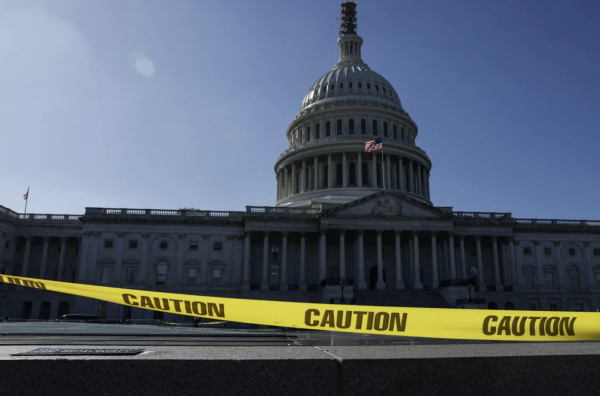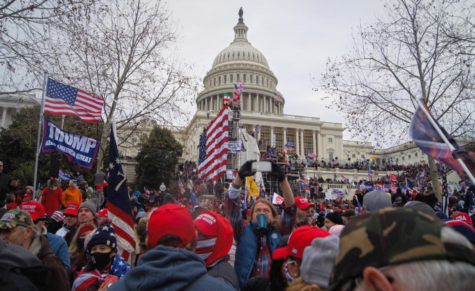Trump wins presidential election against all odds
The morning of Thursday, Nov. 9, a group of jubilant Trump supporters outside of Pressly Hall distributed stickers, waved American flags, and celebrated. Their candidate had become the President-Elect. On the other hand, less than ten feet away, a group of Hillary supporters was dressed in gray and black. Some were weeping, expressing concern of what the country’s future would hold for them. The 2016 presidential race between two highly unpopular candidates with low approval ratings proceeded to divide the nation in two equal pieces separated by a wide gap. 46 percent of the vote went to Clinton, and 46 percent went to Trump (politico.com).
“This election…was so divisive, and over non-politics issues,” said junior and co-leader of the Young Democrats Frances Mize.
On election day, Wednesday, Nov. 8, people around the country voted for not only presidential candidates including Democrat Hillary Clinton, Republican Donald Trump, and Libertarian Gary Johnson, but also Congressional representatives, state representatives, and local representatives.
Westminster students and teachers followed the results of the election intently on news channels, blogs, and radio. The day before, most polls and news channels predicted Clinton’s chance of winning the presidency to be far higher than Trump’s chances, 71 percent and 84 percent from Nate Silver’s 538 website and the New York Times, respectively (forbes.com). Initially, Clinton supporters, trusting the polls, felt confident in their candidate.
“I’d say that around 7:00, I was feeling pretty optimistic,” said senior Myles Hudson. Then, the numbers began to change. More and more swing states were called in Trump’s favor.”
Mize shared a similar shock.
“It did not cross my mind that there was an alternative to her not winning,” said Mize. “That never seemed like it could potentially be reality.”
The campaigns of both Trump, a New York businessman, and Clinton, former Secretary of State, were surrounded by controversies amplified by the media throughout the 2016 election cycle. Trump was accused of running a campaign based on the rhetoric of fear, and his statements describing illegal immigrants as “rapists and criminals,” failure to release his tax returns, inappropriate statements towards women, and proposed ban on Muslims entering the United States aroused strong reactions from both major political parties, in addition to dividing the member of his own party. On the other hand, Clinton had to defend herself from an FBI investigation of her private email server, where she had allegedly shared classified information. Questions were also asked about overseas donations to the Clinton foundation. Strong personal attacks ensued.
“You know, to just be grossly generalistic, you could put half of Trump’s supporters into what I call the ‘basket of deplorables,’” said Clinton on Friday, Sep. 9. “The racist, sexist, homophobic, xenophobic, Islamophobic — you name it” (washingtonpost.com).
Similar sentiments among anyone anti-Trump combined with the inaccurate polling caused the nation to be largely surprised by Trump’s victory.
“I was honestly so surprised,” said sophomore Ansley McNeel. “The fact that Donald Trump won was the last thing I would’ve expected, especially by that much.”
Donald Trump’s surprising victory can be attributed to the large number of clandestine Trump supporters who believed that he was the outsider who would provide the change to fix America’s problems.
“I think a lot of people underestimated the amount of black and Latino voters that came out in support of Trump and the fact that there were a lot of closet Trump supporters in general,” said Hudson.
Many people do not want to openly support Trump because of the negative image associated with being a Trump supporter that the media promotes and Clinton confirms.
“The media has done a good job of denouncing everything Trump has said and done, which is not unreasonable,” said Hudson. “Especially in more liberal communities, to be known as a Trump supporter is to be known as racist, homophobic, xenophobic, misogynist, etc. It’s not entirely incorrect, because to some extent, you have to be tolerant of those things.”
There has been considerable debate on the extent to which Trump supporters exemplify those values that many consider to be backwards.
“[The press] spent a whole year making fun of Trump supporters as ignorant, stupid, and racist,” said history teacher Joe Tribble. “Well, I’m not any of these things, and if I am, God help me to change.”
In addition to winning the presidency, the GOP retained leadership of both the House of Representatives and the Senate, along with a majority of local government offices. Generally, opinions vary regarding the effects of a Trump and Republican-led government.
“Everybody was really tired of the so-called Affordable Care Act,” said Tribble. “I think his–I hope–eight years will be dynamic. I think this country will become great again, and I think it always has been and always will be great. [Trump will] try to control people’s lives through healthcare, [not] taxing them so that they can’t live. The ones who are for Trump, man, they are really happy, really relieved. I think the effect will be all positive.”
After the election, on Nov. 15, the Dow Jones Industrial Average closed at a lifetime high, 18,923.06 (fedprimerate.com). Many attribute the rising stocks to Trump’s victory.
“Two days after the election results, the DOW had a lifetime high,” said senior Michael Rossin. “The future Trump Administration and the Republican-led government have already affected our country and international relations in a positive way. Russia and Syria have publicly said that they want peace with the United States, the UK and Israel are very pleased with the election results and have publicly said that they are looking very much forward to repairing the relationship between the UK and Israel, our closest allies.”
Not everyone is as elated about the prospect of a Trump presidency, however.
“Being a person of color, a minority in pretty much every way except for being male, it’s scary to see that Trump is targeting all these communities,” said Hudson. “That is probably the reason why so many liberals today are grieving for the country, [afraid to] be in a nation where people’s rights are at risk to be infringed upon without any significant opposition.”
Liberals are concerned about the possibility that Trump overturns the Supreme Court’s abortion and gay marriage equality rulings, central points of a liberal agenda.
The historic GOP victory caused protests across the nation for several evenings. In Atlanta on Wednesday night more than 100 protesters marched in the streets refusing to accept that Trump will be their president. Cries of “not my President!” also erupted in New York and Portland, where some described the near-violent protests as riots (wsbtv.com).
Many who supported Clinton were afraid of what Trump’s presidency would bring for their futures.
“The idea of Hillary Clinton not winning was devastating… in a personal way that makes [people] rethink what [their] future’s going to look like, for a lot of groups of people on this campus,” said Mize. “That’s a pretty emotional thing to have to go through the day after the election.”
On the morning following the election, half-awake yet passionate Trump supporters and anti-Trump students and faculty took offense at each others’ actions. For a few days, friends became political enemies. All groups received unwelcome statements, and most everyone felt the need to input their opinion.
“I’m a libertarian, and I would’ve voted for Gary Johnson, even though there’s no way he would’ve won [because] that’s what I believe,” said McNeel. “I got a lot of hate today because… people told me that [my vote would have been] a waste of a vote and Hillary [could have] won.”
Because of the polarizing candidates, the nation’s divisions seemed to deepen coming out of the election.
“I think even though you don’t agree with [Trump], I feel like we need to take this in stride and think of how we can make it better, because a lot of his policies are completely unattainable,” said McNeel. “It will hopefully balance itself out…we have to try to keep an open mind about it.”
Different groups on campus were provoked to a wide spectrum of reactions, from intense anger to immense sadness. Most desire open discourse and peaceful reconciliation.
“Gloating about Trump winning…in front of people who you’re obviously going to be offending and people in general…why gloat?” said McNeel. “I don’t understand why we’re provoking people, and the same thing goes for the people who are actively going around generalizing the negative [Trump supporter stereotypes]. It goes both ways.”
Nonviolence and retaining faith in America were also themes.
“I believe that the best solution to all of this is not protesting or rioting or committing hate crimes,” said Rossin. “I believe and hope that we can, as a nation, resume back to the time when we can all discuss politics in a civil [manner] without it being personal or offensive. As President Obama, Hillary Clinton, Bernie Sanders, and Elizabeth Warren have said, while many would disagree with President-elect Trump, we all have to keep an open mind and hope that he does a great job.”
Another key to reconciling strongly opposed and emotional sides is to attempt to understand the other side.
“Reach out to people who are of the opposing viewpoint and try to understand why they support that side, because often times we can be of the opinion that the other side is completely wrong, that there’s no way they can ever be right,” said Hudson. “It’s important to consider the different perspective of the opposition. [Rioting] be an effective way to get your voice out, but it isn’t the most diplomatic way…The best way to fix the problems in our nation is to make sure that every voice is heard.”
In Clinton’s pained concession speech, she said, “Let us have faith in each other. Let us not grow weary and lose heart, for there are more seasons to come, and there is more work to do” (washingtonpost.com).
“I was still glad that Trump won, but it was devastating to see someone so crestfallen,” said Tribble.
As stated in the United States Pledge of Allegiance, to have “one nation, indivisible, with liberty and justice for all,” those with differing opinions can bring their ideas together to create a stronger nation.
“I believe and hope that with a Republican-led government that the Republican leadership would be open minded and create policies that benefit all Americans by taking the best policies from both the Republican Party and the Democratic Party,” said Rossin.
Despite the hurt in many Americans today, Clinton encourages everyone to be hopeful.
“On the side of the liberals, that’s something important to remember. Obviously, everyone will recover from this election at their own pace..People need to give enough time for them to heal and to reconcile with the results,” said Mize. “Eventually, everyone’s going to have to approach the election with an open mind instead of being angry. Be motivated and be the voice of change and work hard for progress, because there aren’t voices like that in Washington.”






